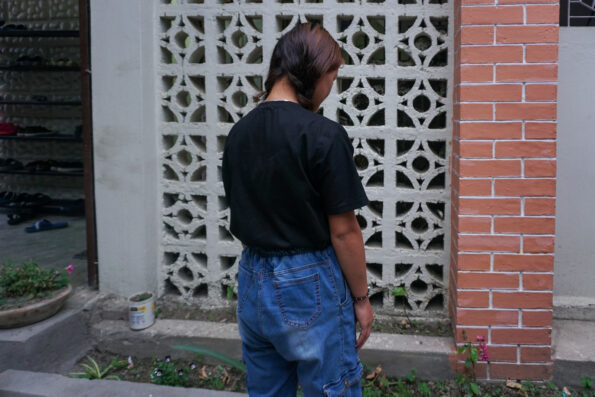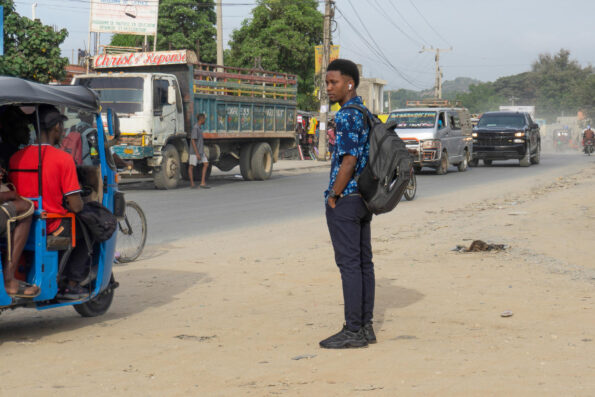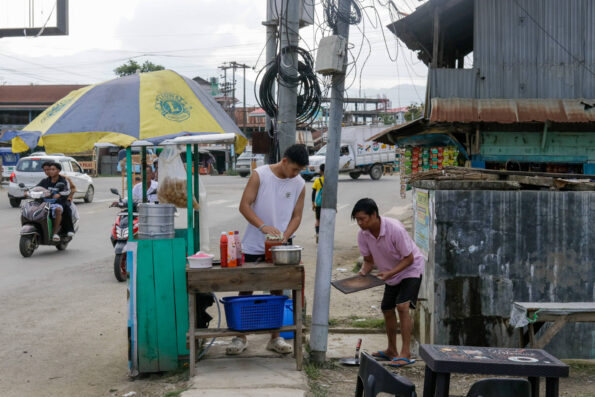
Wairimu Michengi, GPJ Kenya
An African migrant selects clothes at the Karibu Association’s storage room in Madrid, Spain. The organization offers food, clothes and free Spanish lessons to African migrants. It also runs a shelter where homeless African children and abused women live.
MADRID, SPAIN — It’s late afternoon in the Vicálvaro neighborhood in southeastern Madrid. Residents, many of whom are students at the nearby King Juan Carlos University, settle into their apartments for siesta, the afternoon nap that, for many Spaniards, trumps most other activity at this time of day.
But for Hannah, a Kenyan migrant, this is the time to prepare rice and chicken stew, her only meal for the day.
“When I eat at this time, I don’t need to have dinner,” she says.
Hannah asked that the Kenyan version of her first name be used to protect her identity.
Hannah, who does not have the documents she needs to live legally in Spain, shares a three-bedroom apartment with four men. The apartment’s renter, Sam, is also Kenyan. Jobless, he sublets all three bedrooms to unemployed Spaniards to pay his bills, and sleeps on the apartment’s balcony. Once in a while, Hannah says, they emerge from their rooms to make coffee or lunch at the shared kitchenette.
Hannah, 38, spends most of her days curled up on a couch in the living room. At night, she pulls the couch out so that it forms a bed. Every morning, she logs into an old computer at the corner of the room and goes through job sites to look for work as a housekeeper or nanny.
“All potential employers want someone who has papers, yet I don’t have any,” she says.
Sometimes she attends free Spanish lessons at Asociación Puente de Esperanza Madrid, a local aid organization that translated means Bridge of Hope Association. But leaving the apartment is stressful.
“I try very hard not to draw attention to myself,” she says.
Hannah has had just one job since arriving here from Greece in September 2014. She worked for a Spanish family as house help for eight months, earning about 600 euros ($652) per month. That ended in August, when the family moved to another city.
“Sometimes you are lucky to find people who don’t care about the law; that is how I got this job. But such people are not many,” she says.
Hannah is one of an untold number of Kenyans who have sneaked into Europe in search of jobs that would earn enough money for them to make a difference for the family members they left behind. Most pay smugglers between 400,000 shillings ($3,912) to 500,000 shillings ($4,891) to coordinate their travel. Some, like Hannah, are lucky: They fly to Europe before having to make their own way in a strange country. Others risk their lives in dangerous water crossings, or they’re forced to run as border officials open fire on them. (Read about the journey here.)



Many Kenyans head straight for Greece, where for years jobs were easier to come by than they were in other European countries. Then, hoping to gain citizenship, many work with smugglers a second time to move to Spain, which they see as the next step toward Germany, the U.K. or other wealthier countries.
Europe grew increasingly alluring for Kenyans over the past decade, during which unemployment grew in the African nation. Now, most jobless people in Kenya are between the ages of 15 and 34, according to the African Development Bank Group’s 2014-2018 strategy paper for the country. An estimated 35 percent of 20-year-olds are unemployed, the report states.
About 80 percent of Kenya’s population of 44.86 million people are under 35, the United Nations Development Program says. The average yearly income in the country is 370,340 shillings ($3,620), the Economic Survey 2015 states.
But European countries have their own economic problems. Spain, a popular destination for migrants who travel illegally from Kenya, is emerging from an economic crisis that had precipitated one of the highest unemployment rates in its history. The country’s jobless rate stood at 24.5 percent in 2014, up from 8.2 percent in 2007, the year before Spain’s economy gained steam, according to Eurostat.
Greece is mired in a debt crisis and has the highest unemployment rate in the European Union — 26.5 percent in 2014, according to Eurostat.
Now, Kenyans and other African migrants living undercover in those countries face a devastating choice: continue struggling far from home, or return to Kenya, empty-handed and shamefaced at having failed to succeed in a place most Kenyans still think of as a promised land.
“People back home think I live a very good life,” Hannah says. “If only they knew how hard life is here.”
Hannah has a place to sleep, but she lacks many basic needs. She cut her hair because she can’t afford its upkeep. Once a week, she goes to Karibu Association, an aid organization that offers humanitarian support to African migrants in Madrid, and she collects free food and clothes there.
Hannah is a mother; her 11-year-old daughter attends a boarding school in Kenya. For a few years, Hannah was able to pay for her daughter’s school fees. But now, she says, the girl might have to drop out.
Hannah left Kenya because she wanted to make more money than she could at home. She was working as a security guard at a Nairobi shopping mall and earning a gross monthly salary of 10,000 shillings ($98) when a friend introduced her to a smuggler who said he could get her to Greece. That was 2012. The agent demanded 450,000 shillings ($4,403) to facilitate the trip — money Hannah didn’t have. She traveled to her family’s village and persuaded her parents to help her raise the money. They took a bank loan, using their home’s title deed as collateral, and paid the agent.
Within a month, the agent had gotten her a Schengen visa to France, the type of visa used by citizens from dozens of countries who travel to many European nations for up to 90 days. The agent introduced her to 10 other people traveling along with the members of a band that was going to perform in a music festival in France, she says.
“I didn’t even get to know its name or the kind of music it performs,” she says.
At the airport, the agent said, Hannah and the other 10 people traveling with falsified documents were to queue up before the band members.
“I don’t know whether the band members knew we were travelling with them illegally, but they didn’t ask questions,” Hannah says. “But I came to learn later that this happens all the time. A big number of my friends in Greece traveled there with music bands.”
Once in France, Hannah and the other migrants were left to find their own way. Hannah wanted to get to Greece, but she didn’t know where to buy a ticket, or where to go to spend the night. She was stranded in Paris for three days. She spent her nights in train stations, to avoid spending the cash she reserved for her ticket to Greece. She asked people for directions, she says, but they just looked at her and walked away.
On the third day, Hannah says she met a Kenyan man who showed her to an airline office. The office had closed for the day, so the man took her in for the night.
She flew to Greece the next day, she says.
There, jobs were plenty and pay was good. It was only a week before Hannah was hired as a housemaid. She earned between 600 and 800 euros ($652 to $869) each month, and she managed to repay the loan her parents had taken.
“Life in Greece was much easier, but I couldn’t live as an illegal immigrant forever,” she says. “When I found out that Spain issues papers to migrants after three years, I started planning to move here.”
Hannah contacted a Kenyan woman known for smuggling people from Greece to other countries in the EU. The smuggler agreed to relocate her for a fee of 1,000 euros ($1,087). The smuggler, then a holder of a Spanish residency card, sent her a photocopy of that document printed on special paper to look like the real thing, but immigration officials detected that it wasn’t an original.
Three months later, the smuggler sent Hannah her own original residency card and a matching passport. This time, it worked. Hannah flew to Belgium, then took a train to France, then traveled to Madrid by bus. (READ MORE ABOUT THE SMUGGLER HERE)
Hannah wishes she would have stayed in Greece. There, at least, she could send money home to her parents in Kenya, and pay for her daughter’s schooling.
All that changed when she moved to Spain. Now, instead of being a Kenyan who found success in Europe, Hannah is one of an untold number of people living hand-to-mouth, thousands of miles from home. Without papers proving that she is in Spain legally, no one will hire her, she says.
She worries about what people in her home village will say if they find out that she’s jobless.
“I’m sure I would be the butt of every joke in the village if my daughter dropped out of school for lack of fees,” she says.
Sam, the Kenyan who hosts Hannah in his apartment, has not found a full-time job since he moved to Madrid from Greece three years ago. On Friday nights, he works as a bouncer at a local pub, earning 50 euros ($54) per shift. The pay is hardly enough to buy food, let alone pay school fees for his three children in Kenya, ages 6, 11 and 17, who live with Sam’s mother, a peasant farmer. The children’s mother works as a maid in Lebanon.



“He doesn’t call often, and when he does, he says he is still jobless,” observes Sam’s mother, in her modest three-bedroom brick house in King’eero, a semi-urban community near Nairobi. “He says he wants to come back, but I ask him to stay on and keep pushing. He can’t come back with nothing. His children need school fees.”
Sam has a Spanish residency card (READ MORE ABOUT SAM’S STORY HERE), which means he can legally rent an apartment. But he struggles to pay for his place. He can’t afford the 500 euro ($543) rent or utilities, so he sublets the bedrooms. At night, he converts the apartment’s balcony — a small space that acts as laundry room during the day — into his bedroom.
Europe has changed Sam, a once-bitter man who dreamed of killing people who stood in the way of his dream to leave Kenya. (READ MORE ABOUT SAM’S STORY HERE)
But once in Spain, he worked as a baby sitter for another Kenyan migrant. In Kenya, that’s a job reserved for women, he says. Now, he says he’ll do anything, regardless of gender roles.
“Finding a job — any kind of job — is difficult,” he says.
Sam is an electrician. He’d been an apprentice, then worked on his own for more than a decade in Kenya. But no one recognizes his expertise in Spain.
“You can’t even change a bulb here if you do not have certificates from Spanish institutions,” he says.
He’s been away from his family for six years now, and he’s as desperate to reunite with them as he once was to leave Kenya, he says.
“I have to go home next year, even if I go empty-handed,” he says. “I know people will be expecting me to go home loaded with cash after being away for so long. But I don’t care.”
No matter how often migrants describe the hardships of life in Europe, family members back home still expect the migrants, including those who traveled legally, to be enjoying upscale lifestyles.
Sarah Ndegwa, who two years ago joined her husband in Spain, says she was surprised to find him living in a tiny cubicle with just a bed and a TV set.
“Back in Nairobi, I was living in a two-bedroom apartment alone, and I expected him to be doing even better in Europe,” says Ndegwa, who traveled to Spain on a visa.
Her husband moved to Spain four years ago and got a job as a restaurant cook. His salary is three times what he earned as a chef at a luxury golf resort in Nairobi, he says. But costs in Spain are much higher than he ever imagined.
Those who have no means of survival in Madrid rely on Karibu Association and other relief organizations.
“Most migrants arrive here with just a small bag with a few personal belongings,” says Antonio Díaz de Freijo, Karibu’s director. “Some come with nothing after being on the journey for months, sometimes years.”
Díaz and six other people who had worked in Africa as missionaries started Karibu in 1990, when they found a group of migrants from Angola and Nigeria sleeping outside during the winter.
“One of them died,” Díaz says.
Karibu means “welcome” in Swahili.
Each migrant who registers with Karibu receives a membership card with which they can collect food and clothes every week. Karibu gets the food from the local food bank. Clothes are donated by churches. Migrants also learn Spanish and get free legal advice.
Life in Greece is kinder to African migrants. Housekeeping jobs, which pay between 600 and 1,000 euros ($652 to $1,087), are plentiful, migrants say.
“You can quit a job today, walk to an agent’s office tomorrow and find another one,” says Mary, who has lived in Athens for 15 years. Mary asked that only her first name be used to protect her identity.
Employers don’t check job applicants’ immigration papers as often as happens in other European countries, the migrants say. Instead, they ask for a letter of recommendation from a previous employer. Often, the migrants say, they share recommendations letters.
“My friend Anne gave me a copy of her letter. I got a job as a maid and worked as Anne for one year,” says Cathy, who arrived in Greece on a tourist visa two years ago and stayed on. Cathy asked that a version of her name be used to protect her identity.
The cost of living in Greece is low, Mary says. The women say rents range from 100 to 150 euros ($109 to $163) for a basement studio apartment in their neighborhood, and women often live in pairs to split that cost.
Spain is often the next step, because migrants can become legal residents after living there for three years, if they can prove that they have integrated into Spanish society.
Kenyan men struggle to get jobs in Greece. Most earn money washing dishes in restaurants, says John Kabue, a Kenyan migrant, but jobs have become fewer since the economic crisis that, while destabilizing much of the European Union, hit hardest in Greece.
Kabue, who has lived in Athens since 2008, says wages have come down from 50 euros ($54) per day to about 30 euros ($33). Newly arrived migrants are taking even less, he says.
“Men of my age shouldn’t be doing this kind of job,” says Kabue, 54. “Standing at a sink continuously for eight hours is not a joke. But we have no choice.”
James Nyaga, another Kenyan migrant, says most of his friends have returned home after failing to get jobs. They gave themselves up to the police and asked to be deported. It’s a money-saving technique, Nyaga says: Authorities readily facilitate travel back home, and migrants don’t need to spend their own money. For some, the financial loss was already great.
“They went back home with nothing, yet some had sold land in order to come to Europe,” he says.
Nyaga has had work intermittently over the past year. But going home, he says, is out of the question. Even with little money in Greece, he says he’s better off than he was in Kenya, where he worked as a prison warden earning 16,000 shillings ($157) a month.
On Sundays, many Kenyans gather at Hope Restoration Christian Ministries, which meets in Athens. Services are conducted in English, but the congregation mostly sings Swahili songs.
Mary, who serves as an usher, says the church is the only family she has in Greece. Her husband moved back to Kenya two years ago, she says, because he couldn’t find work in Greece. She stayed because she had a good job.
She’s fulfilled by working during the week and serving God on the weekends.
Anthony Muiruri, the church’s Kenyan copastor, has lived in Athens for eight years. Few Kenyans are arriving in Greece these days, he says. He declined to reveal whether he lives legally in Greece.
“We are in a crisis,” he says. “Maybe when the economy improves, people will start coming again.”
Wairimu Michengi translated some interviews from Swahili and Kikuyu.
The Brazen Hope series was produced with support from the Pulitzer Center on Crisis Reporting as part of the Persephone Miel Fellowship program.







